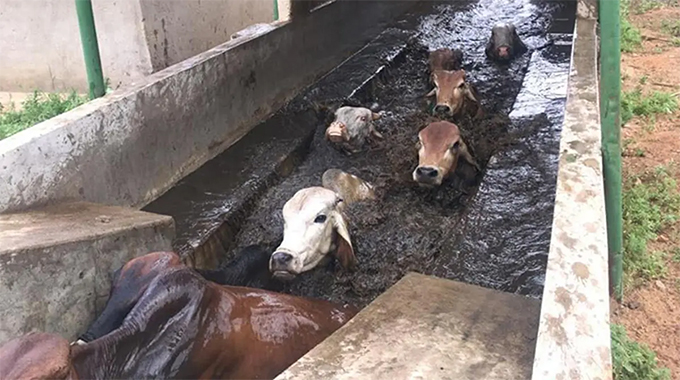‘Adequate dipping chemicals in stock’

Precious Manomano Herald Reporter
Farmers have been assured by the Veterinary Department that it has adequate dipping chemicals in stock but urged cautious use to reduce livestock mortality due to tick borne diseases.
Midlands provincial veterinary director, Dr Martin Sibanda, said the chemicals they have should last them throughout the rainy season.
“The supply of chemicals is now in order but the challenge we are having now is that some of the farmers are refusing to bring their cattle for dipping, claiming that dip tanks are the super spreaders of tick borne diseases, but this is not the case,” he said.
Dr Sibanda said the veterinary department was carrying out awareness campaigns to mobilise communal farmers to bring their cattle for dipping to fight tick borne diseases.
Theileriosis commonly known as January disease has killed thousands of livestock during the rainy season in the past few years.
The tick-borne disease situation in the country has been gradually stabilising in the past four months.
The four major tick borne diseases are Heartwater, Anaplasmosis/Gall sickness, Babesiosis/Red water and Theileriosis/January disease.
In the past year, January disease accounted for more than 60 percent of all the cases and deaths due to tick borne diseases.
Mashonaland West (especially Mhondoro-Ngezi), Masvingo (Gutu district) and Mashonaland East (especially Wedza district) were the worst affected.
Matabeleland provinces have been least affected by tick borne diseases with no January diseases in the two provinces.
Most provinces have now switched from fortnightly dipping (done during the dry season) to weekly dipping (done during the rainy season) as the tick challenge is expected to rise due to the rainy season.
Dr Sibanda urged farmers to complement Government’s effort by continuing contributing US$2 per beast to facilitate procurement of dipping chemicals.
“Farmers were doing this for years. This will sustain our cattle since the outbreak will usually occur in the rainy season.
“This year, tick borne diseases will be low because we have sufficient chemicals in stock,” said Dr Sibanda.
During the 2019/20 agricultural season, there were 46 715 tick borne disease cases and 33 514 deaths while during the 2020/21 period, 25 036 cases were recorded and 12 503 deaths indicating a major decrease of deaths by 62,7 percent.









Comments